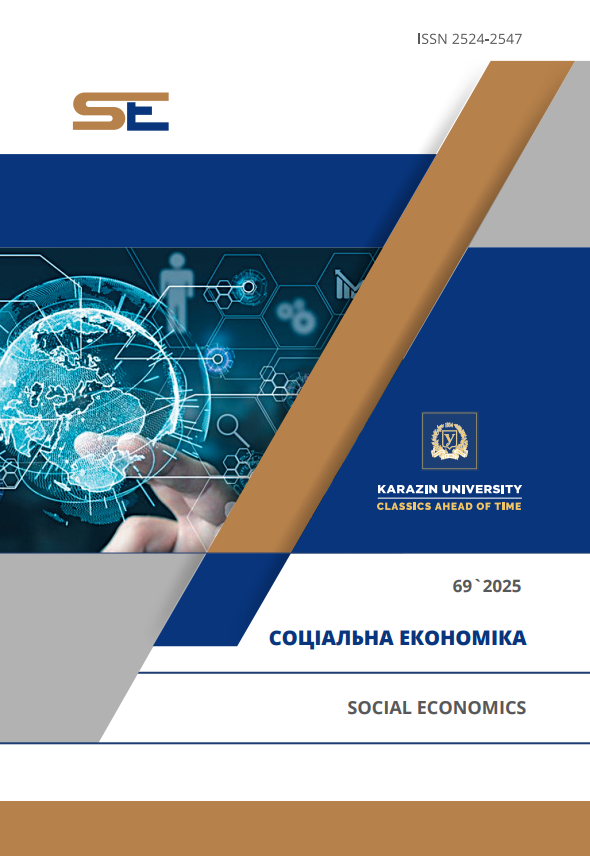INSTITUTIONAL SUPPORT FOR CLIMATE FINANCE: METHODOLOGICAL APPROACHES TO RESEARCH
Abstract
Ukraine currently faces a lack of climate-related projects and an absence of a comprehensive mechanism for state support, particularly financial, for projects aimed at combating climate change, mitigating its adverse effects, and adapting to such changes. Market mechanisms in this area are in the early stages of development. Numerous institutional challenges hinder the implementation of such projects. The relevance of the topic lies in the need to address the shortcomings in the institutional support for climate finance and its components. It is essential to determine what aspects and methods should be prioritized in the study of this issue.
The purpose of this study is to identify methodological approaches to research on the institutional support for climate finance. The object of the research is the global climate finance market. The study employs a systematic approach, monographic, historical, economic-statistical methods, as well as comparative and expert analysis methods.
The significance of the research has been identified, and methodological approaches to studying the institutional support for climate finance have been outlined. Their components and a methodological toolkit for addressing these issues have been presented. The research results can be used to develop institutional frameworks for climate finance.
The proposed methodological approaches to climate finance research enable the identification of promising directions and mechanisms for its development, as well as models of relationships among involved economic agents, which should be based on proper institutional support. At the national level, the methodological foundations of institutional support for climate finance should be shaped by the Financial Stability Council, ministries and agencies, regulators of various financial market segments/exchanges, self-regulating/professional/expert organizations, institutional investors, research institutions, educational establishments, NGOs, and various platforms/councils/target working groups dedicated to addressing these issues.
Downloads
References
Barrett, S. (2022). 20 years of adaptation finance: Taking stock of origins, destinations, and determinants of allocation. In Handbook of international climate finance (pp. 187–212). Cheltenham: Edward Elgar. doi: https://doi.org/10.4337/9781784715656.00015
Bhandary, R. R., Gallagher, K. S., & Zhang, F. (2021). Climate finance policy in practice: A review of the evidence. Climate Policy, 21(4), 529–545. doi: https://doi.org/10.1080/14693062.2020.1871313
Chapagain, D., et al. (2020). Climate change adaptation costs in developing countries: Insights from existing estimates. Climate and Development, 12(10), 934–942. doi: https://doi.org/10.1080/17565529.2020.1711698
Delina, L. (2017). Multilateral development banking in a fragmented climate system: Shifting priorities in energy finance at the Asian Development Bank. International Environmental Agreements: Politics, Law and Economics. doi: https://doi.org/10.1007/s10784–016–9344–7
Doshi, D., & Garschagen, M. (2020). Understanding adaptation finance allocation: Which factors enable or constrain vulnerable countries to access funding? Sustainability. doi: https://doi.org/10.3390/su12104308
Glemarec, Y. (2011). Stimulating Climate Finance: A Guide to Strategic and Financial Solutions for Supporting Environmentally Sound, Low-Carbon, and Climate-Resilient Development. UNDP, New York. Retrieved from https://www.undp.org/sites/g/files/zskgke326/files/publications/UNDP-Catalysing_Dec2011.pdf
Iizumi, T., Shen, Z., Furuya, J., Koizumi, T., Furuhashi, G., Kim, W., & Nishimori, M. (2020). Climate change adaptation cost and residual damage to global crop production. Climate Research, 80(3), 203–218. doi: https://doi.org/10.3354/cr01605
Lamperti, F., Bosetti, V., Roventini, A., Tavoni, M., & Treibich, T. (2021). Three green financial policies to address climate risks. LEM Working Paper Series, 2021/05. Scuola Superiore Sant'Anna, Laboratory of Economics and Management (LEM), Pisa. Retrieved from https://www.econstor.eu/bitstream/10419/243501/1/2021-05.pdf
Nachmany, M., et al. (2014). The GLOBE Climate Legislation Study: A Review of Climate Change Legislation in 66 Countries (4th ed.). London: GLOBE International and the Grantham Research Institute. Retrieved from https://www.lse.ac.uk/granthaminstitute/wp-content/uploads/2014/03/Globe2014.pdf
Newman, R., & Noy, I. (2023). The global costs of extreme weather that are attributable to climate change. Nature Communications, 14(1), 6103. doi: https://doi.org/10.1038/s41467-023-41888-1
Osborn, D., Cutter, A., & Ullah, F. (2015). Universal Sustainable Development Goals: Understanding for Developed Countries. Stakeholders Forum. Retrieved from https://sustainabledevelopment.un.org/content/documents/1684SF_SDG_Universality_Report_May_2015.pdf
Pinko, N., & Pastor, A. O. (2023). Emissions Accounting in Managed Coal Phaseout Finance: Consultation Brief. Climate Policy Initiative. Retrieved from https://www.climatepolicyinitiative.org/wp-content/uploads/2023/03/Emissions-Accounting-in-Managed-Coal-Phaseout-Finance.pdf
Stadelmann, M., Persson, Å., Ratajczak-Juszko, I., & Michaelowa, A. (2014). Equity and cost-effectiveness of multilateral adaptation finance: Are they friends or foes? International Environmental Agreements. doi: https://doi.org/10.1007/s10784-013-9206-5
Tara, K., Saumya, S., & Kumar, R. (2015). Green banking for environmental management: A paradigm shift. Current World Environment, 10. Retrieved from http://www.cwejournal.org/vol10no3/green-banking-for-environmental-management-a-paradigm-shift/
Venner, K., Lamarca, M., & Olazabal, M. (2024). The multi-scalar inequities of climate adaptation finance: A critical review. Current Climate Change Reports. Retrieved from https://www.researchgate.net/publication/380816675_The_Multi-Scalar_Inequities_of_Climate_Adaptation_Finance_A_Critical_Review
Zhang, X., & Li, J. (2021). Credit and market risks measurement in carbon financing for Chinese banks. Energy Economics, 76, 549–557. doi: https://doi.org/10.1016/j.eneco.2018.10.036
Bondarevska, K. V. (2020). Institutional support for social security in the labor market: foreign experience and domestic realities. The Problems of Economy, 2(44), 382–388. doi: https://doi.org/10.32983/2222-0712-2020-2-382-388 (in Ukrainian)
Krasnova, I. V., Prymostka, L. O., & Shevaldina, V. H. (2021). Financial innovations in managing climate risks. German International Journal of Modern Science, 11, 22–26. Retrieved from https://ir.kneu.edu.ua:443/handle/2010/36430 (in Ukrainian)
Maksymova, I. (2024). The global economy in the context of climate change. Scientific Bulletin of the International Association of Scientists, 3(3). doi: https://doi.org/10.56197/2786-5827/2024-3-3-1 (in Ukrainian)
Tykhomirova, Y. (2023). Climate disinformation: interpretation and related concepts. International Relations: Social Communications and Regional Studies, 3, 244–260. Retrieved from https://relint.vnu.edu.ua/index.php/relint/article/view/347/323 (in Ukrainian)

This work is licensed under a Creative Commons Attribution 4.0 International License.




